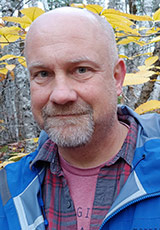Joe Nocera

Associate Professor
Forestry and Environmental Management
I.U.C. Forestry 209
Fredericton
Academic interests
- Endangered Species
- Forest Wildlife Ecology
- Ornithology
Brief biography
Dr. Joseph Nocera joined the Faculty of Forestry & Environmental Management in July 2016 as an Assistant Professor with focus on issues of wildlife management. Dr. Nocera got his BSc in Biology from Connecticut State, his MSc in Biology from Acadia University, and his PhD in Biology, focusing on grassland birds, from UNB.
From 2008 to 2016 he was a Research Scientist in Species-at-Risk with the Ontario Ministry of Natural Resources & Forestry, and a regular graduate faculty member at Trent University. These dual roles gave him the experience to ensure his students’ and his research fill a gap in fundamental wildlife science and serve an applied purpose by entering the policy stream. Many aspects of his work have defined new policy for several levels of government.
Dr. Nocera’s research takes an integrative approach to cross-disciplinary questions in population ecology by modelling wildlife-habitat relationships from a management perspective. He has used field experiments, comparative and meta-analyses, and behavioural, ecological, and physiological datasets to address these questions. His focus has been on field studies of birds (e.g., aerial insectivores and woodpeckers) and mammals (e.g., American badgers, eastern moles).
He largely now works in forested systems, although he has addressed conservation issues using data from a wide range of habitat types (ranging from aquatic to agricultural). Underlying his research is a theme of question-driven science grounded in a solid foundation and appreciation of natural history and wildlife management.
In his personal time he enjoys painting, archery, rock and fossil collecting, and geocaching.
Courses taught
- Forest Wildlife Ecology
- Wildlife Investigation Techniques
- Ornithology
- Population and Community Ecology
- Fall Field Camp
Selected research
English, P.A., J.J. Nocera, B.A. Pond and D.J. Green. 2017. Habitat and food supply across multiple spatial scales influence the distribution and abundance of a nocturnal aerial insectivore. Landscape Ecology 32:343–359
Frei, B., J.J. Nocera, and J.W. Fyles. 2015. Interspecific competition and nest survival of the threatened Red-headed Woodpecker. Journal of Ornithology 156: 743-753.
Nocera, J.J., J.M. Blais, D.V. Beresford, L.K. Finity, C. Grooms, L.E. Kimpe, K. Kyser, N. Michelutti, M.W. Reudink, and J.P. Smol. 2012. Historical pesticide applications coincided with an altered diet of aerially foraging insectivorous chimney swifts. Proceedings of the Royal Society of London B 279: 3114-3120.
Nocera, J.J. and H.M. Koslowsky. 2011. Population trends of grassland birds in North America are linked to the prevalence of an agricultural epizootic in Europe. Proceedings of the National Academy of Sciences of the United States of America 108: 5122-5126.
